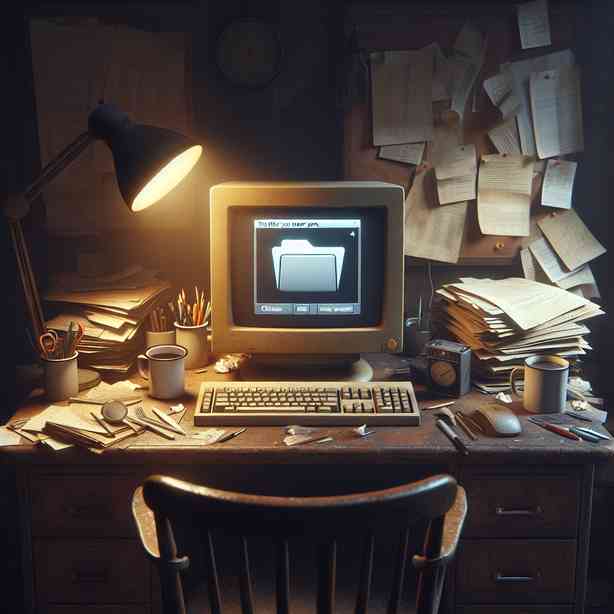
The concept of “The Folder You Never Open” serves as a profound metaphor for the parts of our lives that we choose to ignore or avoid confronting. Just like a digital folder on our devices, there are aspects of our emotions, experiences, and memories that often remain untouched, gathering metaphorical dust as time goes by. In this exploration, we will delve into the significance of these ‘folders’ in our lives, examining what lies within and why we tend to leave them unopened.
To understand why we have these emotional folders, it’s essential to acknowledge that humans are inherently complex beings. Each of us carries a unique tapestry of experiences shaped by our personal histories, societal influences, and emotional health. Some of these experiences are joyful and fulfilling, while others may be painful, traumatic, or simply complicated. Consequently, we may find it easier to set certain memories or emotions aside rather than confront them directly.
For instance, traumatic experiences from our past can create intense emotional reactions that we may not feel ready to face. They become akin to a folder filled with files labeled with fear and anxiety. The longer we leave these files unopened, the heavier they can become, impacting our current state of well-being. This leads to an important question: What do we do with these unopened folders?
The first step toward addressing the contents of our emotional folders is to acknowledge their existence. By recognizing that these feelings or memories are there, we take the first brave step toward understanding what we are avoiding. This act of acknowledgment allows us to shift our perspective, transforming fear into curiosity. What exactly is in that folder? What memories are held within those files, and what lessons can we learn from them?
Moreover, we must also consider the reasons behind our reluctance to open these folders. Often, we fear the emotional turmoil that may arise from revisiting painful memories. The thought of experiencing that pain can deter us from the essential process of healing. However, it is crucial to understand that confronting these emotions doesn’t mean we will be overwhelmed by them; rather, it can lead to healing and growth.
When we finally decide to open up these emotional folders, it becomes vital to approach this process with kindness and compassion toward ourselves. Engaging in self-care practices, seeking support from friends or professionals, or even journaling can help us navigate this journey with more ease. Each time we open a folder, we have the chance to unpack its contents and reflect on the impact they have had on our lives.
As we examine what lies within these folders, we may encounter feelings of sadness, anger, or guilt. It’s natural to feel a mix of emotions when confronting unresolved issues. However, this process also allows us to find clarity and understanding. Each emotion we experience provides insight into our behaviors and reactions, guiding us toward self-discovery and enabling us to make more informed choices in the present.
In addition to emotional pain, these unopened folders often hold missed opportunities, dreams unrealized, or commitments we made to ourselves that we have not yet pursued. Reflecting on these contents can be a transformative experience. It might prompt us to reevaluate our goals and aspirations. What dreams have we placed in this folder? Are there passions we’ve sidelined out of fear or procrastination? By exploring these questions, we can discover new paths forward and take assertive steps toward fulfilling our potential.
Another critical element to consider is the role of vulnerability in opening these folders. Society often conditions us to put on a brave face, to be strong, and to suppress our vulnerabilities. However, it is essential to recognize that vulnerability is not a weakness; rather, it is a unique strength that promotes authentic connections with ourselves and others. By sharing our experiences and emotions with trusted individuals, we create a space for understanding and support. This may inspire others to open their folders, further fostering a culture of honesty and healing.
As we navigate the process of engaging with our folders, it is vital to remind ourselves that healing is not linear. There may be times when we feel ready to confront certain emotions, only to experience setbacks. This ebb and flow is entirely normal and should be treated with gentleness. Providing ourselves with forgiveness and understanding is crucial as we explore this complex terrain of our psychological landscape.
In conclusion, while the concept of “The Folder You Never Open” can be daunting, it also invites us to embark on a journey of self-discovery and healing. By acknowledging these emotional folders, approaching them with kindness, and embracing vulnerability, we can uncover insights that lead to growth. It is crucial to remember that we are not alone in this journey; everyone has their own folders filled with both shadows and light. Ultimately, opening these folders can serve as a powerful catalyst for transformation, leading us toward a more authentic and fulfilling life. Therefore, I encourage you to begin this process at your own pace, inviting curiosity and compassion as your guides. Each step taken toward understanding the contents of your folders can bring you closer to self-acceptance and peace.


